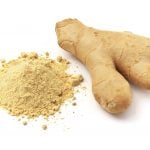Producing adequate milk supply for a newborn baby can be a distressing experience for some new mothers. Here is how supplementing your health after giving birth with Chinese medicine can help ease the burden.
Most mothers-to-be would assume that when it comes to breastfeeding, the milk would flow effortlessly, and the process would be stress free for both mother and baby. Why would it not be when you read so many articles on how breastfeeding is a natural process and when other women share their positive experiences on social media lactation groups, supporting one another in the process?
The reality though? Breastfeeding is challenging and many women struggle with the entire process. It is overwhelming and can be an exhausting experience when you are trying to recover from giving birth and having to tend to a newborn at the same time. The pressure is immense; one cannot help but wonder if she has failed to do what is supposed to be “natural” as a mother.
Some women may have given up the entire process but if one still wishes to try to breastfeed, there are many ways to overcome lactation challenges. For the baby’s health and well-being, a natural solution is always the preferred choice. One such choice is Chinese medicine, as it offers a natural solution through its holistic approach.
| In general, there are two categories of lactation challenges: | |
|---|---|
| Low milk supply | Poor milk flow |
Chinese medicine practitioners attribute low milk supply to insufficient Qi and blood supply in the mother, which is related to her body constitution.
“Mothers experience birth injury and excessive bleeding during childbirth be it through natural birth or Caesarean delivery. This causes Qi exhaustion, hence leading to Qi and blood deficiency and stagnation in a postpartum woman,” explains Sin Yen Suan, a practitioner at the IMU Healthcare’s Chinese Medicine Centre with 10 years of clinical experience.
This stagnation prevents milk from expressing naturally, and eventually causes breast fullness, distension, pain, and engorgement. Postpartum stress can also affect your Qi, says Sin. “In Chinese medicine, we recognise the main cause of disease is due to a deficiency in the heart and spleen, internal obstruction of blood stasis and stagnation of the liver qi. emotions play a part in the health of the heart and spleen. Constant worrying hurts the spleen and exhausts the heart, which will then affect the generation of Qi and blood, leading to postpartum depression. Hence, Chinese medicine treatment emphasizes mainly on regulating and harmonising the Qi and blood, calming the mind at the same time,” says Sin.
Chinese medicine practitioners do recommend complementing modern medicine with Chinese medicine when treating lactation challenges such as mastitis. While antibiotics helps with clearing up the infection, Chinese medicine or acupuncture can treat the blocked Qi that is causing inflammation, swelling and pain.

You may wonder though: Is it safe to consume herbs while breastfeeding? The answer is, yes. It is safe, as most Chinese medicine herbs are plant based. “Generally, herbs prescribed to mothers are safe to take during breastfeeding,” says Goh Si Woei (in the photo on the left), a practitioner at the IMU Healthcare’s Chinese Medicine Centre specialising in women’s health.
| Herbs to Avoid | ||
|---|---|---|
| The molecules of the herbs may affect the baby if the breastfeeding mother is taking some of these herbs. However, the amount of the medication that goes into the breast milk is very low, generally not more than 1% of the mother’s intake.
Fan Xie Ye (Senna Leaf), Da Huang (Rhubarb) and Huang Qin (Chinese Skullcap) contain high levels of alkaloids which may lead to difficulty in breathing and loss of appetite in infants if the mother is taking large doses of these medicines. Hence, these medicines should be used with caution for breastfeeding mother. |
||
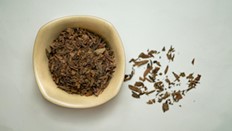 |
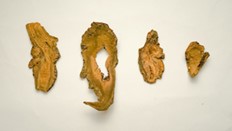 |
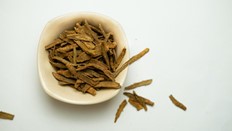 |
“However, you do need to avoid some herbs while breastfeeding. For example, Fan Xie Ye (Senna Leaf), Da Huang (Rhubarb), and Huang Qin (Chinese Skullcap), as these herbs contain high levels of alkaloids that may lead to difficulty in breathing, low body temperature, and a loss in appetite for the mother. Also avoid Chao Mai Ya (Barley Sprouts Malt) and Sichuan Pepper as they can stop lactation altogether,” says Goh. Before taking any Chinese medicinal herbs, it is recommended that you consult your Chinese medicine practitioner for a personalised and targeted recommendation.
| Herbs to Avoid | |
|---|---|
| Hua Jiao (Sze Chuan Pepper) and Chao Mai Ya (Barley Sprouts Malt) have the effect of stopping lactation. | |
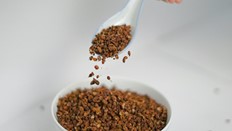 |
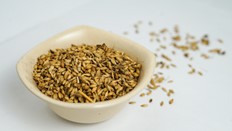 |
It is also common among Malaysian women to observe a traditional confinement period as it is believed to be necessary for the new mother’s care and recovery after childbirth. During this period, the most common treatment offered are a special diet, herbal medicines and postpartum massage therapy. “Postpartum mothers will take at least a bowl of herbal soup daily during the confinement period. The function of the herbal soups is to help with Qi and blood recovery as well as to promote lactation. Herbs that can induce breast milk secretion include Wang Bu Liu Xing (Vaccaria Seeds) and Tong Cao (Rice Paper Pith,),” shares Sin.
| Herbs that Can Induce Breast Milk Secretion | ||
|---|---|---|
| Tong Cao (Rice Paper Pith), Wang Bu Liu Xing (Vaccaria Seeds) and Lou Lu (Radix Rhapontici) can help to unblock the channels, promote lactation and increase volume of milk. | ||
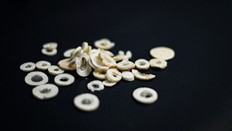 |
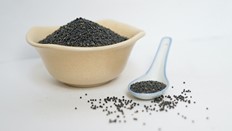 |
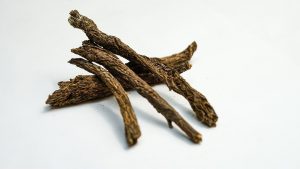 |
She however warns against acupuncture during this confinement period: “Acupuncture is mainly used to induce strong stimulations on certain pressure points. Health wise, new mothers often experience deficient conditions, making them weaker. Acupuncture may lead to fainting or excessive bleeding issues if performed during confinement,” she says. “Once you are past this period though, acupuncture can help to improve the production of breast milk.”
A HOLISTIC APPROACH
Whether it’s modern or Chinese medicine, one thing that can help with breastfeeding is this: The well-being of the mother, both physically and psychologically. When one is in good health, the body will then be able to function as it should. So, when a new mother eats well, gets enough rest as well as is emotionally calm and relaxed, breastfeeding can come easily.
As for diet, from the perspective of Chinese medicine, Goh recommends avoiding raw and cold food like sushi and salad as well as cold drinks during breastfeeding. In addition, the nursing mother should not be on a diet to lose weight. “A balanced nutrition supplements the Qi and blood, which can provide sufficient breast milk. Take a balanced diet of moderate high fat food, fish, eggs, lean meat, and other high-quality protein. Eat more fresh vegetables, fruits, whole grains, and nuts to guarantee the vitamins, mineral and dietary fibre intake. Also, drink plenty of water for milk production. Generally, an adult woman should drink 1.5 litres of water every day. To produce sufficient breast milk, a nursing mother should drink that and an additional 750ml of water,” she says.
Her other recommendations? “Get plenty of rest. The synthesis and secretion of milk are affected by many hormones. Adequate sleep and rest are conducive to hormone balance. Poor quality of sleep affects the Heart and may affect the blood. This can result in the quantity of breast milk. Also, maintain a good mood. New mothers are prone to stress and anxiety, which will affect milk secretion. Mood fluctuation will affect the Liver Qi easily and this can prevent the Qi from flowing properly, thus affecting breastfeeding.”
| MUSIC THERAPY FOR BREASTFEEDING | |
|---|---|
| Maintaining a calm and relaxed mind has proven to improve your breastfeeding experience – music is a good source of therapy for this! Chinese medicine recommends the five elements (Earth, Metal, Wood, Fire and Water) as a guide on the kind of music to help address specific discomforts that may prevent you from being able to breastfeed. | |
| Earth: | Quiet, solemn, and steady beats that can help relieve spleen and stomach discomforts. |
| Metal: | Loud and majestic tunes to help relieve lung discomforts. |
| Wood: | Vibrant, lively, and pleasant music to help relieve liver illness. |
| Fire: | Joyful, lively, and vivid music to relieve heart illness. |
| Water: | Cool and soft tones to relieve kidney illness. |
In the News:
China Press, 14 August: No milk for baby? TCM helps with lactation
Daily Straits, 3 August 2021: The Importance Of Qi For Nursing Mums
Utusan Malaysia, 11 October, 2021: Herba Penggalak Susu Ibu




 Sin Yen Suan, a practitioner at the IMU Healthcare’s Chinese Medicine Centre with 10 years of clinical experience
Sin Yen Suan, a practitioner at the IMU Healthcare’s Chinese Medicine Centre with 10 years of clinical experience 
